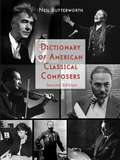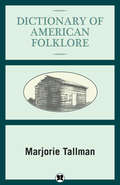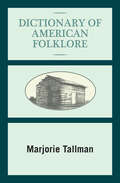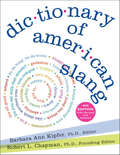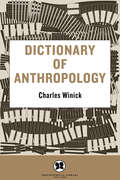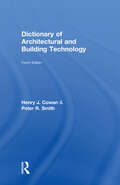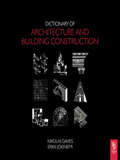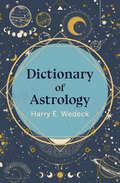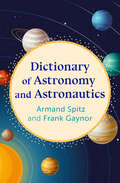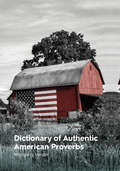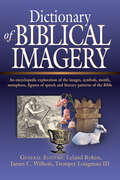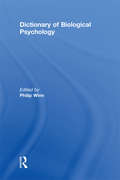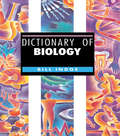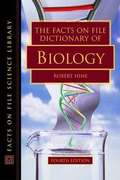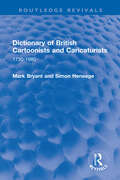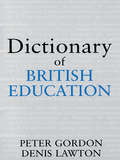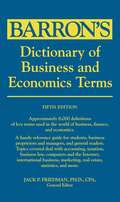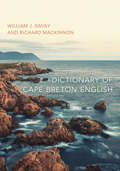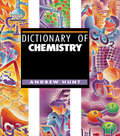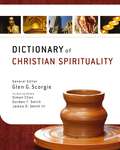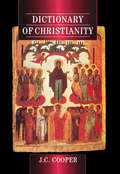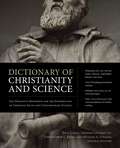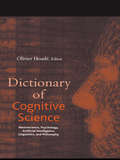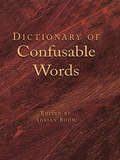- Table View
- List View
Dictionary of American Classical Composers
by Neil ButterworthThe Dictionary of American Classical Composers covers over 650 composers active from the 18th century to today. Covering all classical styles, it offers the most comprehensive overview of key composers in the United States available.Entries include basic biographical information and critical analysis of each composer's key works and ideas. Entries also include worklists and bibliographic information. Whenever possible, the entries will have been checked by the composers themselves to assure greatest possible accuracy. This new edition, completely updated and expanded from the 1984 edition, also includes over 200 historic photographs.
Dictionary of American Folklore
by Marjorie TallmanDiscover the delightful tales, characters, and themes of classic American storytelling in this comprehensive Dictionary of American Folklore. Ever wonder the origins of the fairy tales, myths, and legends passed down from generation to generation throughout America's long history? From Paul Bunyan to Johnny Appleseed, Marjorie Tallman covers it all in an engaging voice sure to please readers of all ages.
Dictionary of American Folklore
by Marjorie TallmanDiscover the delightful tales, characters, and themes of classic American storytelling in this comprehensive Dictionary of American Folklore. Ever wonder the origins of the fairy tales, myths, and legends passed down from generation to generation throughout America&’s long history? From Paul Bunyan to Johnny Appleseed, Marjorie Tallman covers it all in an engaging voice sure to please readers of all ages.
Dictionary of American Slang
by Barbara Ann Kipfer Robert L. ChapmanThe fourth edition of this authoritative reference offers clear definitions for the slang words and idioms used in everyday American conversation.First published in 1960, this newly updated edition of Dictionary of American Slang traces the language of today back to its American roots. With thousands of entries ranging from the widely accepted to the taboo and obscure, slang words are explained in terms of definition, usage, and historical etymology. As language continues to evolve at an ever-increasing rate, Dictionary of American Slang offers an essential guide to the terms that are here to stay—as well as those that might otherwise be forgotten.
Dictionary of Anthropology
by Charles WinickThe Dictionary of Anthropology is a comprehensive explication of basic terms and concepts of archaeology, cultural anthropology, linguistics, and physical anthropology. The terms have been selected from standard source and instructional materials, and include identifications of some major early contributors to anthropology. This is the only collection in any language of the specialized vocabularies of all the fields of anthropology. It is a handbook not only for anthropologists but for everyone interested in the study of man and of man's cultural and physical heritage.
Dictionary of Architectural and Building Technology
by Peter Smith Henry CowanA comprehensive summary of the vocabulary used across the building industry, from the preparation of an architectural brief, through creative and technical design, to construction technology and facilities management. The latest edition has several substantially revised entries as well as many new additions, including new illustrations and terms. Covering a range of disciplines across architecture and building and including both SI metric and Imperial units, this dictionary and reference work will enable students and professionals to use and understand vocabulary from other areas of expertise, and contribute to better communication.
Dictionary of Architecture and Building Construction
by Nikolas Davies Erkki JokiniemiWith more than 20,000 words and terms individually defined, the Dictionary offers huge coverage for anyone studying or working in architecture, construction or any of the built environment fields.The innovative and detailed cross-referencing system allows readers to track down elusive definitions from general subject headings. Starting from only the vaguest idea of the word required, a reader can quickly track down precisely the term they are looking for.The book is illustrated with stunning drawings that provide a visual as well as a textual definition of both key concepts and subtle differences in meaning. Davies and Jokiniemi's work sets a new standard for reference books for all those interested in the buildings that surround us.To browse the book and to see how this title is an invaluable resource for both students and professionals alike, visit www.architectsdictionary.com.
Dictionary of Astrology
by Harry E. WedeckThis A-to-Z reference book comprises astrological techniques and concepts as well as the historical figures who have contributed to the study of astrology.Covering astrological traditions from across the globe, this authoritative guidebook offers an in-depth overview of the complex and fascinating world of astrology. Spiritualist and occult scholar Harry E. Wedeck provides a wealth of information on astrological terminology, ideas, theories, and principles, as well as the history of astrology from antiquity to the present. Wedeck also includes biographical information on major figures in the field, from the Arabian astrologer Abben-Ragel to Zoroaster, the Persian founder of the cult of Zoroastrianism. For practicing astrologers, students of horoscopes, or anyone exploring the wisdom of the stars, Dictionary of Astrology is an essential reference work.
Dictionary of Astronomy and Astronautics
by Frank Gaynor Armand SpitzThis authoritative reference volume features more than 2,200 terms and concepts covering a wide array of topics in astronomy and astronautics. This in-depth overview of important terms and concepts in the fields of astronomy and astronautics is designed to be an authoritative and easy-to-use reference book. With thousands of entries arranged alphabetically, it provides ready answers for students of space science as well as the curious reader. From &“Aberration of Light&” and &“Abnormal Stars&” to &“Zodiacal Light&” and &“Zone Time&”, this comprehensive volume provides a wealth of fascinating information.
Dictionary of Authentic American Proverbs
by Wolfgang MiederDictionary of Authentic American Proverbs offers a comprehensive reference guide for distinctly American proverbs. Compiled by Wolfgang Mieder, a key figure in the field of proverb studies, this compendium features nearly 1,500 proverbs with American origins, spanning the 17th century to present day, including a scholarly introduction exploring the history of proverbs in America, the structure and variants of these proverbs, known authors and sources, and cultural values expressed in these proverbs. Along with a comprehensive bibliography of proverb collections and interpretive scholarship, this dictionary offers a glimpse into the history of American social and cultural attitudes through uniquely American language.
Dictionary of Biblical Imagery: An Encyclopaedic Exploration Of The Images, Symbols, Motifs, Metaphors, Figures Of Speech, Literary Patterns And Universal Images Of The Bible
by Tremper Longman III Leland Ryken James C. WilhoitChristianity TodayDictionary of Biblical ImageryThe Dictionary of Biblical Imagery
Dictionary of Biological Psychology
by Philip WinnBiological Psychology is the study of psychological processes in terms of biological functions. A major obstacle to understanding dialogue in the field has always been its terminology which is drawn from a variety of non-psychological sources such as clinical medicine, psychiatry and neuroscience, as well as specialist areas of psychology such as ethology, learning theory and psychophysics. For the first time, a distinguished international team of contributors has now drawn these terms together and defined them both in terms of their physical properties and their behavioural significance.The Dictionary of Biological Psychology will prove an invaluable source of reference for undergraduates in psychology wrestling with the fundamentals of brain physiology, anatomy and chemistry, as well as researchers and practitioners in the neurosciences, psychiatry and the professions allied to medicine. It is an essential resource both for teaching and for independent study, reliable for fact-checking and a solid starting point for wider exploration.
Dictionary of Biology
by Bill IndgeThis Dictionary provides an explanation of the main ideas of and concepts central to biology. Rather than offer an exhaustive list of technical terms, the author has selected a range of basic terms that are likely to meet the needs of most readers and librarians. The entries cover not only the traditional subject areas but also many of the topics that form the distinctive parts of human and social biology. Each entry in the Dictionary of Biology begins with a clear, one-sentence definition, followed by a further explanation, and, where appropriate, by specific examples. Numerical ideas are supported by working examples. Entries are cross-referenced, and the A-Z arrangement makes the book very easy to use.
Dictionary of Biology (4th edition)
by Robert HineAimed at high school students, this reference defines the basic principles and terms used in the field of biology. Approximately 300 new entries have been added to this fourth edition, including entries on beta-oxidation, cerebral nuclei, DNA fingerprinting, and rapid eye movement. Pronunciation symbols and new line illustrations have also been added. The appendices include charts of the animal and plant kingdoms and amino acids, as well as a list of online resources.
Dictionary of British Cartoonists and Caricaturists: 1730-1980 (Routledge Revivals)
by Mark Bryant Simon HeneageOriginally published in 1994, this dictionary provides a unique 'who’s who' of the major figures in the world of British cartoons and caricatures. It was the first book to encompass the entire field from c.1730 when Hogarth published the first of his 'modern moral pictures' to 1980. In addition to describing the careers and achievements of the artists and the characteristics of their styles, more than 500 entries give details of their publications, their illustrations to books and periodicals, exhibitions of their work, public collections in which their work is represented and literature on or referring to them. More than 150 illustrations are included. This is a comprehensive reference work and will be of interest to social and political historians as well as cartoon and caricature enthusiasts.
Dictionary of British Education (Woburn Education Series)
by Denis Lawton Peter Gordon Professor Peter Gordon Professor Denis LawtonThis is an up-to-date guide for teachers and parents, administrators, governors , students and others to help the find their way about the increasingly complex world of education. The main section provides a dictionary that is more than a simple set of definitions: many words in education have been put into some kind of historical context to become fully meaningful. The second part gives some important landmarks from the nineteenth century to the present time, and also provides a list of political heads of education since state education was established. The final section is devoted to a list of acronyms and abbreviations, both of which have been the subject of multiple definitions in recent years.
Dictionary of Business and Economic Terms (Barron's Business Dictionaries)
by Jack P. FriedmanA Simon & Schuster eBook. Simon & Schuster has a great book for every reader.
Dictionary of Cape Breton English
by William John Davey Richard P. MackinnonBiff and whiff, baker's fog and lu'sknikn, pie social and milling frolic - these are just a few examples of the distinctive language of Cape Breton Island, where a puck is a forceful blow and a Cape Breton pork pie is filled with dates, not pork.The first regional dictionary devoted to the island's linguistic and cultural history, the Dictionary of Cape Breton English is a fascinating record of the island's rich vocabulary. Dictionary entries include supporting quotations culled from the editors' extensive interviews with Cape Bretoners and considerable study of regional variation, as well as definitions, selected pronunciations, parts of speech, variant forms, related words, sources, and notes, giving the reader in-depth information on every aspect of Cape Breton culture.A substantial and long-awaited work of linguistic research that captures Cape Breton's social, economic, and cultural life through the island's language, the Dictionary of Cape Breton English can be read with interest by Backlanders, Bay byes, and those from away alike.
Dictionary of Chemistry
by Andrew HuntThis Dictionary provides an explanation of the main ideas of and concepts central to chemistry. Each entry in this A-Z resource begins with a clear, one-sentence definition that explains why the term is important. These sentences are followed by a fuller explanation and, where appropriate, examples, diagrams, tables and equations. Key terms such as inorganic chemistry, organic chemistry, physical chemistry, the chemical industry, and qualitative analysis tell the user about the main features of important aspects of chemistry, with cross-references leading to related terms in each field. Other entries give a historical perspective, showing in outline how important themes of chemistry have developed.
Dictionary of Christian Spirituality
by Glen G. Scorgie Gordon T. Smith James D. Smith III Simon ChanIn recent decades Christian spirituality, spiritual formation and spiritual theology have become important concepts in the global evangelical community. Consequently, an accessible and reliable academic resource is needed on these topics—one that will offer a discerning orientation to the wealth of ecumenical resources available while still highlighting the distinct heritage and affirming the core grace-centered values of classic evangelical spirituality. The Dictionary of Christian Spirituality reflects an overarching interpretive framework for evangelical spiritual formation: a holistic and grace-filled spirituality that encompasses relational (connecting), transformational (becoming), and vocational (doing) dynamics. At the same time, contributors respectfully acknowledge the differences between Reformed, Holiness, and Pentecostal paradigms of the spiritual life. And, by bringing together writers from around the world who share a common orthodoxy, this reference work is truly global and international in both its topical scope and contributors. Entries give appropriate attention to concepts, concerns, and formative figures in the evangelical tradition of spirituality that other reference work neglect. They offer a discerning orientation to the wealth of ecumenical resources available, exploring the similarities and differences between Christianity and alternate spiritualities without lapsing into relativism. The Dictionary of Christian Spirituality is a resource that covers a wide range of topics relating to Christian spirituality and is biblically engaged, accessible, and relevant for all contemporary Christians.
Dictionary of Christianity
by J. C. CooperFirst Published in 1996. Routledge is an imprint of Taylor & Francis, an informa company.
Dictionary of Christianity and Science: The Definitive Reference for the Intersection of Christian Faith and Contemporary Science
by Tremper Longman III Christopher L. Reese Michael Strauss Paul CopanThe Dictionary of Christianity and Science provides, in one volume, entries on over 450 key terms, theories, individuals, movements, and debates at the intersection of Christian faith and contemporary science. In addition, because certain topics such as the age of the Earth and the historicity of Adam and Eve provoke disagreement among Christians, the dictionary includes “Counterpoints”-like essays that advocate for the views most commonly held among evangelicals. Representatives of leading perspectives present their arguments vigorously but respectfully in these advocacy essays, allowing readers to compare options and draw their own conclusions. The dictionary is also fully cross-referenced and entries include references and recommendation for further reading. Edited by Paul Copan, Tremper Longman III, Christopher L. Reese, and Michael G. Strauss, the Dictionary of Christianity and Science features a top-notch lineup of over 140 contributors in the fields of biblical studies, theology, philosophy, history, and various sciences. A unique reference work, it will be useful for scholars, pastors, students, and any Christian wanting to better understand the most relevant issues and ideas at the intersection of Christian faith and science.
Dictionary of Christianity in America
by Daniel G. Reid Robert D. Linder Bruce L. Shelley Harry S. StoutThis single volume does what most libraries cannot-- it places at your fingertips the whole spectrum of individuals, traditions, institutions, denominations, events, and ideas that have influenced North American religion and culture.
Dictionary of Cognitive Science: Neuroscience, Psychology, Artificial Intelligence, Linguistics, and Philosophy
by Olivier HoudéA translation of the renowned French reference book, Vocabulaire de sciences cognitives , the Dictionary of Cognitive Science presents comprehensive definitions in more than 120 subjects. Topics range from 'Abduction' to 'Writing', and each entry is covered from as many perspectives as possible within the domains of psychology, artificial intelligence, neuroscience, philosophy, and linguistics. The editor and his advisory board, each a specialist in one of these areas, have brought together 60 internationally recognized scholars to give the reader a comprehensive understanding of the most current and dynamic thinking in the cognitive sciences.
Dictionary of Confusable Words
by Adrian Room Anne-Lucie NortonFirst Published in 2000. Routledge is an imprint of Taylor & Francis, an informa company.
